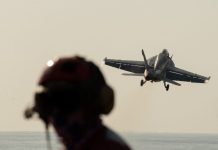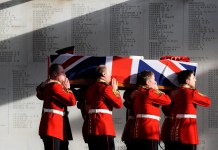Sudan’s Army has vowed to hold talks with all political parties on forming a civilian government, asserting it has no “ambitions to hold the reins of power” following President Omar al-Bashir’s expulsion.
The proposal on Friday was immediately rejected by the Sudanese Professional’s Association (SPA), which spear-headed the months-long protests that triggered al-Bashir’s overthrow by the armed forces the previous day.
Omar Zein al-Abideen, a member of the transitional military council, which is now running Sudan under General Awad Ibn Auf, said the body was “ready to step down as early as a month if a government is formed”.
Speaking in Sudan’s capital, Khartoum, al-Abideen said the solutions to Sudan’s crisis should come from the protesters. “We are the protectors of the demands of the people,” he said. “We are not greedy for power.”
“We will not dictate anything to the people. We want to create an atmosphere to manage a peaceful dialogue,” al-Abideen said, pledging to begin talks as early as Friday. Al-Bashir’s National Congress Party was not invited to join the dialogue because “it is responsible for what happened”, he said. “We are not going to intervene. Just give us the government list and we will agree upon it and welcome it,” said al-Abideen.
Pakistan Has Vital Role To Play In The Afghan Peace Talks: US
The state news agency SUNA said Ibn Auf planned to meet with political factions and leaders of the protest movement later on Friday and that he was holding off with announcing the full makeup of the military council pending the consultations. But the SPA dismissed the council’s announcement, saying it was “not capable of creating change”.
Pledging to resist the military council’s moves by peaceful means, the SPA restated its demand for power to be handed immediately to “a transitional civilian government”. “We are still in the path of true revolution,” the group said.
At the army headquarters, the mood among the crowds was festive. Some protesters brought in mattresses, fans and even air conditioners, while others swept the streets to keep them clean, signalling they intend to stay long term.
As thousands of Muslim worshippers lined up in the street to hold prayers, Christian protesters held blankets over them to shade them from the sun in a show of solidarity.
Men and women in the crowds beat drums, clapped and chanted, “Down with military rule” and “We won’t be silent until Ibn Auf is out.” Dozens unfurled a meters-long Sudanese flag and marched around the square, chanting, “Freedom.”
Al-Abideen, the military council member, warned protesters that the army would not tolerate unrest. “Protest is guaranteed, but it is forbidden to infringe on the freedom of others. We will be very decisive with whoever closes a road or a bridge,” he said.
Al Jazeera’s Hiba Morgan, reporting from Khartoum, said thousands of Sudanese protesters were continuing to join the crowds camped outside the army headquarters in the capital.
Thousands had defied a curfew imposed from 10 pm to 4 am overnight on Friday to maintain the days-long sit-in outside the sprawling complex.
“Their [the protesters’] whole point is that they don’t want anybody from the old regime or the former ruling party to be a part of the transitional council,” said Morgan. “At the moment, the military council’s remarks do not seem to be enough.”
The paramilitary Rapid Support Forces also rejected the military takeover, Morgan said, citing an announcement by the group, which said the military council’s move “falls short of what the people have been demanding for the past four months”. The paramilitary forces said they would not take part in the council, she added.
Separately, the military council announced that it would not extradite al-Bashir to face charges of genocide at the International Criminal Court in The Hague.
In the Darfur conflict in the 2000s, up to 300,000 people were killed and 2.7 million driven from their homes by militias backed by al-Bashir’s government. “We may try him, but we will not hand him over”, said al-Abideen. To do so would be “an ugly mark on Sudan … even rebels carrying weapons, we don’t extradite them”.
Notably, Ibn OAuf, a veteran establishment insider was himself under sanctions by the United States for his alleged role in supporting those militias. Ibn Auf said on Thursday that al-Bashir was being detained in a “safe place”.
Did Pakistani Pilots Really Train on Qatar’s Rafale Fighter Jets?
Sudanese sources told Reuters news agency that the long time ruler was at the presidential residence under “heavy guard”. Ibn Auf had also announced a state of emergency, a nationwide ceasefire and the suspension of the constitution.
World powers, including the United States and Britain, said they supported a peaceful and democratic transition sooner than two years. China said it would continue to seek cooperation with Sudan regardless of the political situation.
Antonio Guterres, UN chief, called for a transition that would meet the “democratic aspirations” of the Sudanese people and appealed for “calm and utmost restraint by all”.
More News at EurAsian Times
- Indian Military Base in Sabang can Strangle China at the Strait of Malacca
- Why is Japan Unhappy with Bullet Train Project in India?
- Is Saudi-UAE Alliance Working to Weaken the Gulf Cooperation Council?
- India-Japan Defence Partnership Aggressively Countering China
- Oman-UAE Relations Deteriorate; Muscat Warns Against Testing Patience




